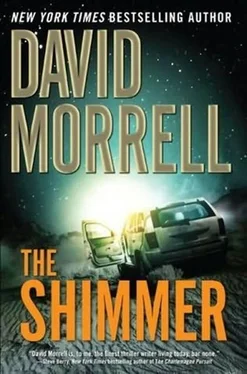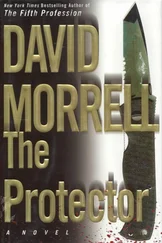“Sergeant, put an M4 in a rucksack, along with plenty of ammunition.”
“You’re expecting trouble, sir?”
“As I recall, you enjoy motorcycles.”
“I do, sir. I used to race them when I was a kid.”
“When you arrived, perhaps you noticed the Harley-Davidson in the far corner.”
“I did, sir.”
“It’s kept here for emergency transportation. In perfect working order, on a storage rack so its tires don’t rest on the concrete and disintegrate. You’ll need to make sure they’re properly inflated and check the battery. There’s a fuel can behind it. The crowd up there will notice if you drive one of the Suburbans out of here. But if you walk the Harley to the gate and don’t start it until you’re on the road, there’s a good chance you can leave without attracting attention.”
“Where do you want me to go, sir?”
Raleigh told him.
Lockhart frowned.
“It’s probably nothing,” Raleigh said. “But drive over to the observatory and find out for sure. Here’s the key to the gate. Use this two- way radio. When you get to the observatory, tell me everything you’re doing. Step by step.”
“Absolutely, sir.”
“A Black Hawk’s scheduled to arrive soon with more equipment. If there’s trouble, the men aboard the chopper can be called upon to help.”
“Good to know, sir.” Lockhart saluted and headed past the Suburbans toward the motorcycle.
As Raleigh watched him, he made a mental note to select someone else on the team to shoot the German shepherd if the dog acted strangely in even the slightest way.
His attention was drawn to the stain on the wall he’d noticed earlier, the faint red of which looked like long-ago faded rust but wasn’t.
The crowd again parted reluctantly to let Harriett’s truck through. Page noticed that Medrano was still there, watching the crane set the final concrete barrier in place. The wall was high enough that nothing could be seen beyond it.
“Harriett, could you stop here for a second?” Page asked.
He got out and walked over to Medrano, whose red Highway Patrol patches were vivid on the upper part of his tan shirtsleeves.
“Be careful. That television reporter might be around here,” Medrano warned. “We’ll finish questioning you and Tori as soon as things calm down. The first part of the week, you and your wife can be on your way.”
“Good, that’ll work. It’s important for my wife to be in San Antonio by Tuesday morning. Meanwhile, I was wondering if you could give me some information.”
Medrano peered at him curiously. “About what?”
“The man who shot all those people Thursday night. You mentioned that the Austin police had spoken with his brother. That’s how you found out that the shooter’s wife had died.” Page couldn’t help thinking of Tori’s disease and the unendurable grief he would feel if he lost her.
“That’s correct,” Medrano said.
“I wonder if you have a phone number for the brother, or maybe you could put me in touch with an Austin police officer who could help me do that.”
“You’re investigating on your own?” Page couldn’t tell whether or not Medrano was displeased.
“There’s something I’d like to ask him.”
“I hope you’re not telling anybody that you’re a police officer with authority here in Rostov.” Yes, Medrano was definitely displeased.
“I know the rules,” Page said. “But as long as I make it clear I’m just an interested citizen, I don’t see the harm.”
“Why on earth would he want to talk to you, the husband of the woman who shot his brother to death?”
“He doesn’t need to know that much. But even if he did, there’s nothing wrong with expressing my condolences.”
Medrano still looked skeptical. “What’s your question? Maybe the Austin police can ask it for you.”
“Or maybe you or Chief Costigan could do the asking.”
Medrano studied him and sighed. “Why do I get the feeling that’s what you had in mind all along?”
“Mr. Mullen, I’m Captain Medrano of the Texas Highway Patrol.”
The speakerphone sat on the table next to Costigan’s hospital bed.
“And I’m Roger Costigan, the police chief here in Rostov.” Despite his injury, his gravelly voice was strong enough to project to the phone. “That’s the town near the area where-”
“I know where Rostov is,” the male voice said wearily from the phone.
Page and Tori watched from the foot of the bed.
“Thanks for taking the time to talk to us,” Medrano continued. “I’m very sorry to disturb you.”
“Your medical examiner still hasn’t released Ed’s body,” the voice said irritably. “I don’t even know when I can schedule the funeral.”
“That’s not acceptable,” Medrano said. “I’ll take care of that.”
“What Ed did was so awful, I still can’t believe he did it. But no matter what, he was my brother. Mom and Dad aren’t alive anymore. It’s up to me to make sure he gets a proper burial. I bet the relatives of the people he shot would say he doesn’t deserve it, but he’s my brother.”
“I learned a long time ago not to judge people,” Costigan said.
Page knew the chief was lying. Most police officers expected the worst in people.
“What did you want to talk about?” the tired voice asked. “I told the Austin police everything I know.”
“There are just a few loose ends we need to tie up, and we’ll try to keep it brief. After your brother’s wife died…”
“Cancer. It was so damned unfair. Ann was always a saint, always helping people. She was one of the kindest, most generous people I’ve ever met. People always used to kid Ed and tell him he didn’t de- serve her. How come serial killers don’t get cancer? Why does it al- ways need to be someone who’s good and decent?”
At the mention of the word “cancer,” Page inwardly winced. He hadn’t been told before how Mullen’s wife had died. He glanced at Tori. The reference had made her pale.
“You said that before his wife died, your brother wasn’t religious,” Medrano continued.
“Never went near a church since my parents made us go with them when we were kids,” the voice replied.
“But after your brother saw the lights…”
“Which I still don’t believe in. If you want my opinion, people are either playing a joke or hallucinating. I didn’t see them, and believe me, I tried. But Ed…”
Page hurriedly wrote something on a slip of paper.
Medrano looked at it. “Maybe your brother’s grief is what made him think he saw the lights. Do you suppose that’s possible?”
“It makes as much sense as anything. Of course I had no idea Ed was going back so many times to that-what do they call it?- observation area. Once was enough for me. I should’ve made him go to a psychiatrist instead of taking him on that damned tour.”
“And that was when he started collecting the religious paintings and statues?” Costigan asked.
The voice sounded exasperated now. “Ed wouldn’t let me in his apartment. We always met at my house, or in a park or a restaurant or whatever. I had no idea he had all that stuff until after the police contacted me.”
“Did he ever talk about God?”
“All the time. I assumed it was because he missed Ann so much that he was determined to believe in heaven so he could convince himself Ann was in a better place and that he’d join her there one day. He stank.”
Costigan sat higher in the hospital bed. “Stank?”
“He wouldn’t bathe. He said the hot water felt so good that it made him feel guilty. The only foods he ate were things he hated-turnips, brussels sprouts, pigs’ knuckles. He slept on the floor. He set an alarm clock to wake him every two hours. He told me Ann had suffered so much that he didn’t have the right to enjoy anything. He said if he did anything that felt good, it would be like admitting he’d never loved her as much as he’d claimed. As far as he was concerned, the only way he could prove how much he loved her was by punishing himself. Lord, I can’t tell you how much I wish I’d made him go to a psychiatrist.”
Читать дальше












